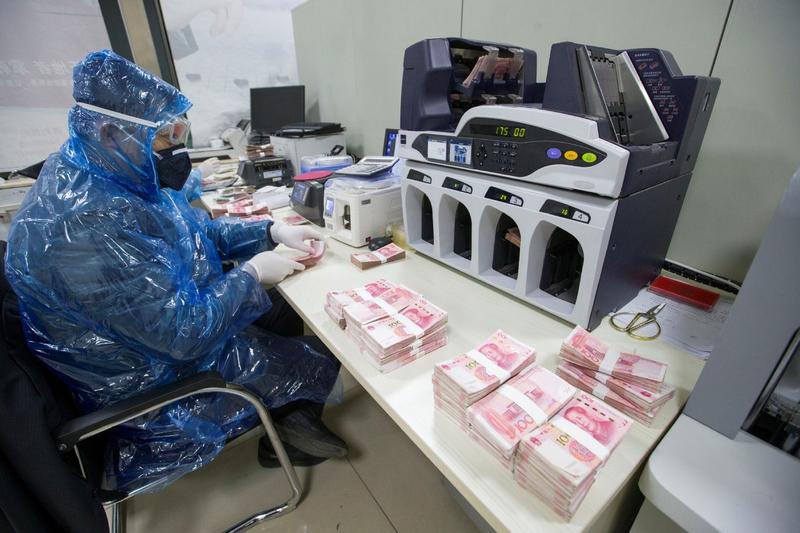
An employee wearing a plastic raincoat with a face mask and protective goggles sorts Chinese yuan banknotes at a bank, as the country is hit by an outbreak of the novel coronavirus, in Taiyuan, Shanxi province, Feb 24, 2020. (PHOTO / CHINA NEWS SERVICE)
Strengthening macro adjustments and expediting capital market reforms will be top priorities for policymakers as China seeks more measures to tackle the protracted downside risks due to the COVID-19 epidemic, economists said on Thursday.
The financial stability and development committee under the State Council, China's cabinet, said in a statement after a meeting on Wednesday that the Chinese economy faces greater external risks than internal ones, with macro risks outnumbering the micro ones. Domestic business activity has gradually revived, while the overseas economic situation continues to be deeply affected by the COVID-19 pandemic, it said.
The key to cope with the challenges lies in increasing the intensity of countercyclical macro adjustments, including broad-based and structural measures that act on the supply and demand side, the statement said
The key to cope with the challenges lies in increasing the intensity of countercyclical macro adjustments, including broad-based and structural measures that act on the supply and demand side, the statement said. The committee also carried out a special study on strengthening investor protection in the capital market during the meeting, calling for heavier punishment against financial fraud, false statements and other malpractices.
This was the second consecutive meeting of the committee that underscored capital market reforms. The committee regarded exerting the pivotal role of the capital market in the economy as one of the top work priorities in the earlier meeting last week.
"This has signaled the policy stance of ramping up macro stimulus, and at the same time facilitating factor market reforms to let the capital market lend more support for the real economy," said Wu Chaoming, chief economist with Chasing Securities.
These measures are aimed at reacting to economic challenges brought by the COVID-19 and a global recession, Wu said.
The policy intention is also reflected by a top-level guideline released last week. The guideline called for improving the mechanisms for market-based allocation of production factors, including reforming the rules of issuance, trading and delisting in the stock market and expediting bond market development.
"As the world economy is facing a long-term predicament brought by the pandemic, the fundamental way out for China is to expedite its high-quality development agenda," said Cheng Shi, chief economist at ICBC International.
The International Monetary Fund said on Tuesday that the worst economic downturn since the Great Depression in the 1930s is beckoning the global economy, with projected global growth in 2020 set to fall to a negative 3 percent.
ALSO READ: China's economic growth contracts 6.8% in Q1
By releasing the capital market's function of elevating resource allocation efficiency, the nation will get refreshed momentum for quality growth, Cheng said.
Strengthening investor protection is indispensable for capital market reforms, he said, adding that it will help reduce information asymmetry and promote market stability.
The policy focus on investor protection and crackdown on securities malpractice also came as Luckin Coffee's sales data fabrication reports triggered investor concerns, analysts said.
Integrity and compliance with laws are the most basic market disciplines, the statement said, urging securities regulators to step up efforts to ensure authentic, accurate, complete and timely information disclosure from listed firms.
The statement also called for putting the announced supportive measures for medium, small and micro-sized enterprises into place.
The People's Bank of China, the central bank, said in a statement on Thursday that it will continue ramping up credit support for small and micro businesses via targeted cuts in the reserve requirement ratio, re-lending, and other measures.
Wu said the authorities should seize the window of April and May to roll out the basket of macro policies and stabilize domestic demand, with fiscal policies to play a prominent role, coupled with supportive monetary policies.
READ MORE: Epidemic's impact on economy to be 'manageable'
Coupons that can be traded for consumer goods and cash subsidies to households will help activate the depressed consumer market in the short term, but a sustainable recovery in consumption relies on effective measures to stabilize income and employment, he said.


